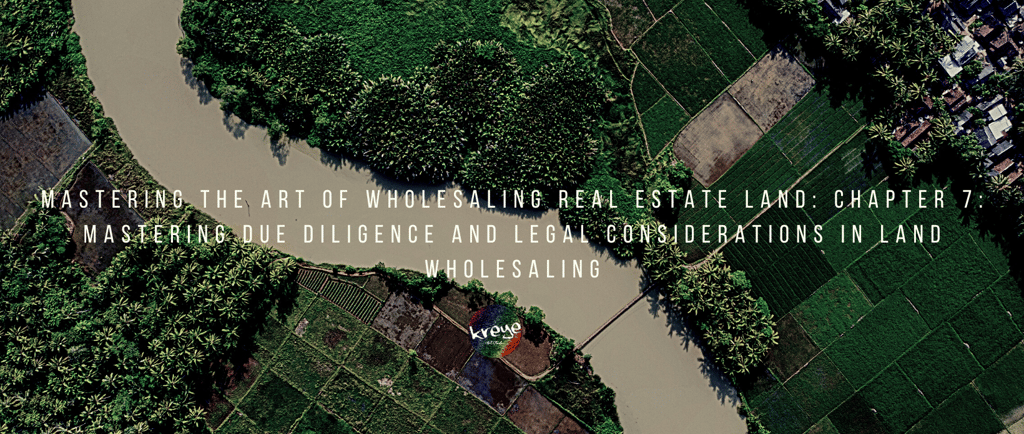Mastering the Art of Wholesaling Real Estate Land: Chapter 7: Mastering Due Diligence and Legal Considerations in Land Wholesaling
REAL ESTATEENTREPRENEURSHIP


In the world of land wholesaling, thorough due diligence and a sound understanding of legal considerations are non-negotiable. This chapter serves as your guide, leading you through the meticulous process of conducting due diligence. We'll delve into critical elements such as title searches, zoning verifications, environmental assessments, and other crucial investigations. Additionally, we'll explore the legal framework, contracts, and potential pitfalls to ensure that your land deals are airtight and legally sound.
Section 1: The Foundation of Wholesaling Integrity - Due Diligence
1.1 The Imperative of Due Diligence
Due diligence is the backbone of wholesaling integrity. It's the process of rigorously investigating a potential land deal to uncover any hidden issues, risks, or discrepancies that may impact its viability. Effective due diligence provides you with a comprehensive understanding of the property's history, status, and potential, allowing you to make informed decisions and mitigate risks.
1.2 Beyond Surface-Level Scrutiny
Effective due diligence goes beyond superficial assessments. It involves a systematic and thorough investigation, leaving no stone unturned. By digging deep into various aspects of the property, you ensure that your evaluation is comprehensive and accurate.
Section 2: The Crucial Components of Due Diligence
2.1 Title Searches - Ensuring Ownership Clarity
A clear and marketable title is the bedrock of a viable land deal. Conducting a title search involves examining public records to verify ownership, identify any encumbrances, liens, or easements, and ensure that the seller has the legal right to transfer the property. A clouded title can lead to legal complications down the line, making thorough title research imperative.
2.2 Zoning Verifications - Complying with Regulations
Zoning regulations dictate how a piece of land can be used. Verifying the property's zoning status ensures that it aligns with your intended use or development plans. It also helps identify any restrictions or limitations that may impact the property's value or potential.
2.3 Environmental Assessments - Unearthing Potential Hazards
Environmental due diligence involves assessing the property for potential environmental hazards or contamination. This step is especially crucial for properties with industrial or agricultural histories. Environmental assessments may uncover issues that could impact the property's development potential or pose legal liabilities.
2.4 Survey and Boundary Analysis - Defining Property Lines
A property survey involves precisely measuring and mapping the boundaries of the land. It ensures that there are no encroachments or boundary disputes. A clear understanding of property lines is essential for making accurate assessments and avoiding legal complications in the future.
Section 3: The Legal Framework of Land Wholesaling
3.1 Contracts - The Cornerstone of Agreements
Contracts are the formal agreements that govern land transactions. A well-drafted contract outlines the terms, conditions, and responsibilities of both the buyer and the seller. It provides legal protection and serves as a reference point in case of disputes.
3.2 Legal Counsel - Navigating Complexities
Engaging legal counsel specializing in real estate transactions can provide invaluable guidance. They can review contracts, conduct additional legal research, and offer expert advice on any legal intricacies specific to the land deal. While it may involve an additional cost, it's an investment in safeguarding the legal integrity of your transactions.
Section 4: Potential Pitfalls and Mitigation Strategies
4.1 Identifying Red Flags
Recognizing potential pitfalls is a crucial aspect of due diligence. Look for warning signs such as unresolved title issues, zoning conflicts, or environmental concerns. By identifying these red flags early on, you can proactively address them or, if necessary, reconsider the deal.
4.2 Contingencies and Exit Strategies
Including contingencies in your contracts provides an exit strategy in case unforeseen issues arise during due diligence. These contingencies may allow you to renegotiate terms, request repairs, or, in extreme cases, terminate the contract without penalties. Having well-defined contingencies safeguards your interests.
Conclusion: Ensuring Wholesaling Success through Diligence and Legal Expertise
Chapter 7 has unveiled the critical importance of due diligence and legal considerations in land wholesaling. By conducting thorough investigations, understanding legal frameworks, and implementing risk mitigation strategies, you fortify the foundation of your wholesaling endeavors.
Remember, diligence is not just a process; it's a commitment to integrity and excellence. It's the assurance that every land deal you pursue is backed by meticulous research, legal soundness, and a clear path to success. As you embark on your land wholesaling journey, carry with you the knowledge that due diligence and legal expertise are your greatest allies.
In the upcoming chapter, we will delve into the art of negotiation and communication, exploring the strategies and principles that underpin successful land transactions.


